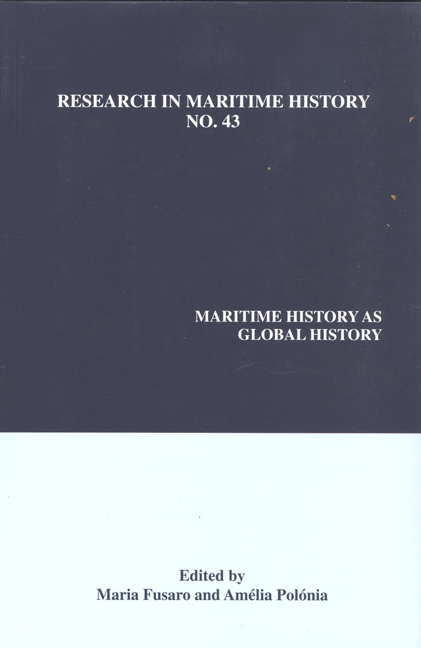Book contents
- Frontmatter
- Contents
- About the Editors
- Contributors' Notes
- “Maritime History: A Gateway to Global History?”
- “Behind the Atlantic Expansion: Flemish Trade Connections of Seville in 1620”
- “National and International Labour Markets for Sailors in European, Atlantic and Asian Waters, 1600-1850”
- “Maritime Expansion and (De)globalization? An Examination of the Land and Sea Trade in Seventeenth-Century Mughal India”
- “From Hold to Foredeck: Slave Professions in the Maritime World of the East India Company, c. 1660-1720”
- “Small Town Merchants, Global Ventures: The Maritime Trade of the New Julfan Armenians in the Seventeenth and Eighteenth Centuries”
- “Lighting up the World? Empires and Islanders in the Pacific Whaling Industry, 1790-1860”
- “Technological Advances in the Maritime Sector: Some Implications for Trade, Modernization and the Process of Globalization in the Nineteenth Century”
- “Lost in Calculation? Norwegian Merchant Shipping in Asia, 1870-1914”
- “Why Are the Major Oil Companies Selling Off their Fleets? The Case of Total”
- “Turning Maritime History into Global History: Some Conclusions from the Impact of Globalization in Early Modern Spain”
- “Maritime History as Global History? The Methodological Challenges and a Future Research Agenda”
“From Hold to Foredeck: Slave Professions in the Maritime World of the East India Company, c. 1660-1720”
- Frontmatter
- Contents
- About the Editors
- Contributors' Notes
- “Maritime History: A Gateway to Global History?”
- “Behind the Atlantic Expansion: Flemish Trade Connections of Seville in 1620”
- “National and International Labour Markets for Sailors in European, Atlantic and Asian Waters, 1600-1850”
- “Maritime Expansion and (De)globalization? An Examination of the Land and Sea Trade in Seventeenth-Century Mughal India”
- “From Hold to Foredeck: Slave Professions in the Maritime World of the East India Company, c. 1660-1720”
- “Small Town Merchants, Global Ventures: The Maritime Trade of the New Julfan Armenians in the Seventeenth and Eighteenth Centuries”
- “Lighting up the World? Empires and Islanders in the Pacific Whaling Industry, 1790-1860”
- “Technological Advances in the Maritime Sector: Some Implications for Trade, Modernization and the Process of Globalization in the Nineteenth Century”
- “Lost in Calculation? Norwegian Merchant Shipping in Asia, 1870-1914”
- “Why Are the Major Oil Companies Selling Off their Fleets? The Case of Total”
- “Turning Maritime History into Global History: Some Conclusions from the Impact of Globalization in Early Modern Spain”
- “Maritime History as Global History? The Methodological Challenges and a Future Research Agenda”
Summary
Introduction
Recent scholarship has broadened the term “middle passage” to include multiple forced migrations. Slavery under the Estado da India and among unlicensed Portuguese traders; the people-trafficking of the Dutch from the seventeenth century; and the organized slave-trading networks of the French and their partners after the acquisition of Mozambique in the eighteenth century have all received attention. A new wave of historical and anthropological works has begun to document the African presence in South Asia as a consequence of the Indian Ocean trade. Nevertheless, with few exceptions, the involvement of the English East India Company (EIC) in this trade is still discussed mainly with reference to the nineteenth-century anti-slavery campaign. I will discuss why the EIC's early involvement in coerced labour has been obscured and how this disparity could be corrected.
Focusing on slaves’ professions is one way to shift the study of scholarly networks in the early modern period away from a “centre-periphery“ model to examine movements and interactions of people, specimens, plants, medicines and expertise across oceans and territories. The participation of slaves in the transmission and creation of botanical, medical and linguistic knowledge has been studied with reference to the Atlantic World and the empire of the Dutch East India Company (VOC). Slaves also played an important role in the creation of knowledge in the diverse settlements of the early EIC where the transfer of expertise was an important motivation for their transportation. While Europeans considered the botanical and medical knowledge of slaves invaluable, they also feared their skills with plants and poisons, and while they relied on slave soldiers and sailors, they dreaded the prospect of rebellion. Slaves’ work sometimes helped them resist their conditions by obtaining pay, privileges or freedom for their expertise, or by means of armed rebellions or covert poisonings.
Occluding Slavery
Of the many maps of the East India Company's early settlements, I have found only two that show evidence of slavery. One in the City Museum of Mumbai estimated to date from the early eighteenth century shows “Madagascar Town,” a relatively large area beyond what is now Back Bay, close to the burial or cremation grounds of Christians, Muslims and Hindus. The second map, now in Delhi, shows the “coffree barracks” (quarters for soldiers of African origin) in mid-eighteenth-century Madras.
- Type
- Chapter
- Information
- Maritime History as Global History , pp. 95 - 124Publisher: Liverpool University PressPrint publication year: 2010



